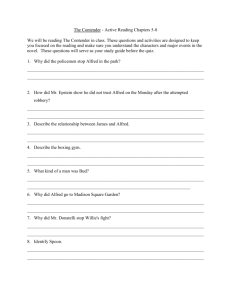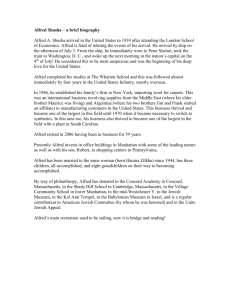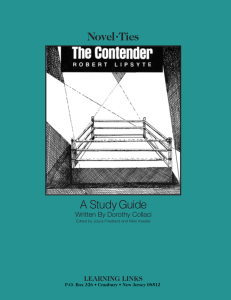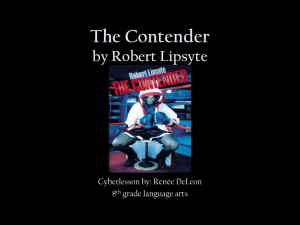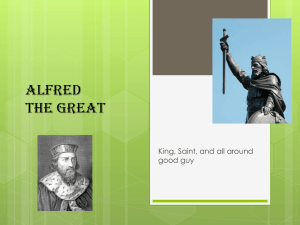The Contender
advertisement
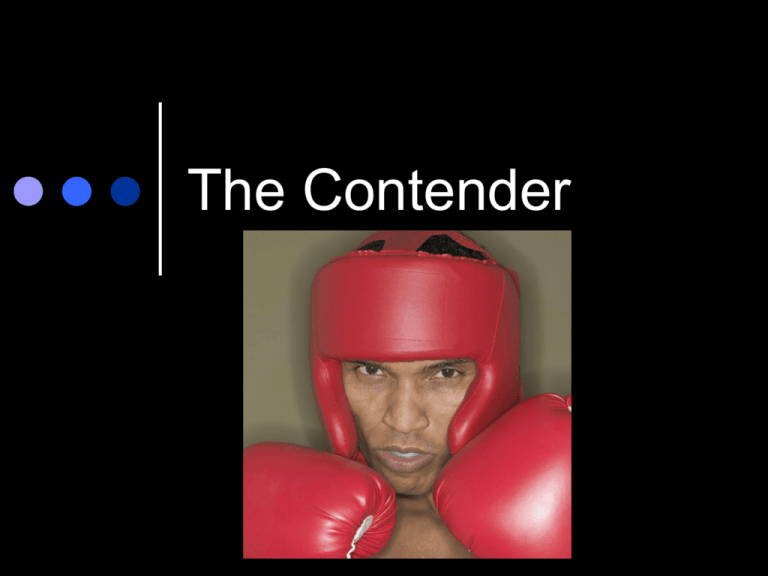
The Contender Characters Alfred Brooks James Mosely Henry Johnson Donatelli Aunt Pearl Bill Witherspoon Bud Martin Lou Epstein Hollis Major Hubbard Uncle Wilson Alfred Brooks Main character: Protagonist African American youth who has dropped out of high school Works at a grocery story owned by the Epsteins Wants to become a boxer and works rigorously to be a contender Desires a sense of belonging yet wants to be himself. James Mosely Alfred’s only so-called friend Attempts to rob the Epsteins’ grocery store with Major and Hollis but is caught by police Becomes a drug addict and disregards Alfred Tries to rob the Epsteins’ grocery again and is injured. Henry Johnson Works for Donatelli as an assistant trainer. Disabled from polio as a child Helps get Alfred home after Alfred is badly beaten by Major and Hollis Supports Alfred’s attempts at becoming a boxer. Plans to become a boxing manager like Donatelli Donatelli Boxing manager who cares for his fighters Encourages Alfred to try to be a contender not only in the ring but in life Does not allow his boxers to get badly injured in a boxing match Is one of the only people that Alfred feels he can trust Aunt Pearl A widow who is Alfred’s guardian When she finds out that Alfred is boxing, she tells him that she is glad he has finally found something to be excited about; she just wishes it wasn’t boxing. Churchgoing woman who longs for a better life Admits that she did not do what she wanted to do in her life. She wanted to be a singer Has a sister who lives in Queens- a much nicer neighborhood. She is proud of this. Bill Witherspoon (Spoon) Former boxer for Donatelli Donatelli and Spoon realized that Spoon would never be a boxing champion; therefore, Donatelli encouraged him to quit and go to college full-time Spoon became a teacher Mentors and encourages Alfred Bud Martin An older man who has been a long time assistant to Donatelli. Lands a strong punch to Red’s jaw when Red starts causing trouble in the gym Lou Epstein Former, good light-weight champion who Bud describes as a thin-skinned bleeder. Owner of the grocery store at which Alfred works and that James, Hollis, and Major rob Tells Alfred that boxing has become dishonest due to television and corrupt managers Tells Alfred that he trusts him but that he doesn’t want to tempt fate, meaning he wants to trust Alfred, but questions his ability to since Alfred sometimes runs with Major, James, and Hollis. Hollis and Major Try to rob the Epstein’s grocery after Alfred tells them about the money in the register Beat Alfred up for not telling them about the alarm Steal a car and takes it to Coney Island Try to pressure Alfred to join their gang- get him drunk, get him high on marijuana, hook him up with a girl Call Alfred “slave” for working at Epsteins’ Uncle Wilson Married to Alfred’s Aunt Dorothy Lives in Queens Always brags about his son Jeff who is attending college Tells Alfred that opportunities are opening up for African-Americans who have an education Hubbard Ex-marine boxer who impressed Alfred at Madison Square Garden Alfred’s last boxing opponent Pummels Alfred and wins the boxing match. Setting Harlem, New York in 1960s during the Civil Rights Movement Plot Alfred Brooks is a young black man whose life seems to be going nowhere. He has dropped out of high school and works at a a grocery store. Alfred desperately wants to be different, be special. One night he wanders into a boxing gym and meets a boxing manager who cares about the fighters he trains. Alfred commits himself to the rigor of training to become a contender, not only a contender in the boxing ring but in life. Although he works hard, Alfred struggles to stay focused in an environment full of distractions. Themes “Nothing’s ever promised [to] you,” Donatelli directly states this theme to Alfred at the boxing gym. Being a contender in life requires one to “climb as far and as hard as he can.” Donatelli also tells Alfred this at the gym. Being individualistic and independent requires one to have the courage to ignore the pressures from peers to conform. Links: Compare/Contrast Langston Hughes “Mother to Son” Well, son, I'll tell you: Life for me ain't been no crystal stair. It's had tacks in it, And splinters, And boards torn up, And places with no carpet on the floor— Bare. But all the time I'se been aclimbin' on, And reachin' landin's, And turnin' corners, And sometimes goin' in the dark Where there ain't been no light. So, boy, don't you turn back. Don't you set down on the steps. 'Cause you finds it's kinder hard. Don't you fall now— For I'se still goin', honey, I'se still climbin', And life for me ain't been no crystal stair.
